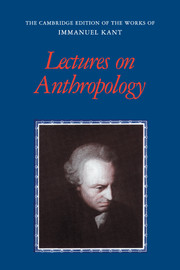Book contents
- Frontmatter
- Contents
- General editors’ preface
- Preface
- Abbreviations
- General introduction
- Anthropology Collins 1772–1773
- Anthropology Parow 1772–1773
- Anthropology Friedländer 1775–1776
- Anthropology Pillau 1777–1778
- Menschenkunde (1781–1782?)
- Anthropology Mrongovius (1784–1785)
- Translator's introduction
- Lecture of the Winter semester 1784-1785 Based on the Transcription Mrongovius, Marienburg
- Anthropology Busolt, 1788–1789
- Editorial notes
- Glossary
- Bibliography
- Index
Lecture of the Winter semester 1784-1785 Based on the Transcription Mrongovius, Marienburg
Published online by Cambridge University Press: 05 April 2013
- Frontmatter
- Contents
- General editors’ preface
- Preface
- Abbreviations
- General introduction
- Anthropology Collins 1772–1773
- Anthropology Parow 1772–1773
- Anthropology Friedländer 1775–1776
- Anthropology Pillau 1777–1778
- Menschenkunde (1781–1782?)
- Anthropology Mrongovius (1784–1785)
- Translator's introduction
- Lecture of the Winter semester 1784-1785 Based on the Transcription Mrongovius, Marienburg
- Anthropology Busolt, 1788–1789
- Editorial notes
- Glossary
- Bibliography
- Index
Summary
FIRST CHAPTER INTRODUCTION TO ANTHROPOLOGY
There are two ways to study: in school and in the world. In school one studies scholastic cognitions, which belong to scholars by profession; but in social intercourse with the world one studies popular cognitions, which belong to the whole world. –
Now whoever wants to apply scholastic cognitions, which one uses only in the school and in scholarly writings, for use in the world without seeing whether or not they hold interest, is a pedant, namely, a pedant with regard to the subject matter; but if he actually has a great deal of knowledge and merely does not know how to make his knowledge understandable except in methodical form, then he is a pedant with regard to the manner.
The word “pedant” originally comes from Latin, for in Italy one called the domestic tutors magistri pedanei.The Italian word pedanto came from this, as one left off the magistrio and changed pedanei into pedanto; hence today theGerman word Pedant.These people were supposedly not to be received outside of their study rooms; they thus applied only their school knowledge when they were in social intercourse and therefore gave people the occasion to call a person who did not know how to conduct himself with human beings a “pedant.” A pedant can make only a scholastic use of his knowledge because he does not know how to apply it any better and does not know any other use for it.
- Type
- Chapter
- Information
- Lectures on Anthropology , pp. 339 - 510Publisher: Cambridge University PressPrint publication year: 2012

